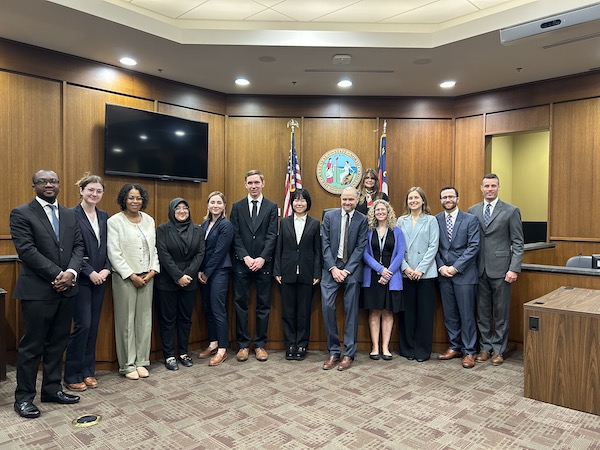Students spend fall break on pro bono trip
Ten JD and LLM students traveled to Asheville, North Carolina, to help assist clients with expunging their criminal records.
In October, 10 students in the Pro Bono Program took a trip to Asheville, North Carolina, to help clients in a Criminal Record Expunction Clinic. By partnering with Pisgah Legal Services, the JD and LLM students expunged 244 records for 15 residents of Asheville and western North Carolina.
Students began the trip by preparing the work, reviewing records, drafting petitions, drafting advice letters, and pulling all the documents together. During the client appointments, students met with their clients to review their records eligibility and advise clients on what they could expunge. After meeting with clients, students prepared the documents for the court at the Buncombe County Courthouse.


For many students, this was their first time interacting with real clients. They were able to use their skills of sensitivity and attentiveness to the client's needs and issues, which helped them build a rapport with their clients.
“Getting to work on a real client's case and making a positive impact on their life during the Criminal Record Expunction Clinic reminded me of why I came to law school. It helped me see the bigger picture of why I'm working so hard in my studies. Classes can seem abstract and theoretical, so it was refreshing to do hands-on work, practicing soft skills like client interviewing and oral advocacy,” said Holly Merrill ’26.


During court sessions, students highlighted clients' stories and built an understanding of the circumstances that led to their client's criminal records. They also presented petitions for the judge to review and grant their expulsions.
Nicholas Opoku LLM ’24 said, “The Criminal Record Expunction Clinic offered me the unique opportunity to leverage my skills, in a meaningful way, to assist clients (mostly racial minorities) who had been denied opportunities for jobs and housing as a result of their criminal records (in some cases for a simple worthless check). The client interviews, petition drafting, and courtroom advocacy were great exposure.”